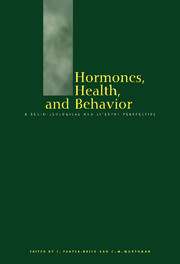Book contents
- Frontmatter
- Contents
- Contributors
- 1 Contributions of biological anthropology to the study of hormones, health, and behavior
- 2 Hormonal correlates of personality and social contexts: from non-human to human primates
- 3 Epidemiology of human development
- 4 Family environment, stress, and health during childhood
- 5 Work and hormonal variation in subsistence and industrial contexts
- 6 Reproductive ecology and reproductive cancers
- 7 Diet, hormones, and health: an evolutionary–ecological perspective
- 8 Modernization, psychosocial factors, insulin, and cardiovascular health
- Index
8 - Modernization, psychosocial factors, insulin, and cardiovascular health
Published online by Cambridge University Press: 29 January 2010
- Frontmatter
- Contents
- Contributors
- 1 Contributions of biological anthropology to the study of hormones, health, and behavior
- 2 Hormonal correlates of personality and social contexts: from non-human to human primates
- 3 Epidemiology of human development
- 4 Family environment, stress, and health during childhood
- 5 Work and hormonal variation in subsistence and industrial contexts
- 6 Reproductive ecology and reproductive cancers
- 7 Diet, hormones, and health: an evolutionary–ecological perspective
- 8 Modernization, psychosocial factors, insulin, and cardiovascular health
- Index
Summary
Introduction
The health effects of the alteration of traditional occupations, physical activity, and diets by exposure to modern ways of life have been described in many cross-national, cross-sectional, and longitudinal studies. The energetic and metabolic consequences of modernization, such as adiposity in adults and its role in cardiovascular disease (CVD) risk factors, have been the focus of most modernization studies. Fewer studies have been able to measure behavioral, attitudinal, and emotional factors, their physiological concomitants, and their associations with health and disease.
The purpose of this chapter is to describe the role of hormones associated with energy metabolism and the sympathetic nervous system (SNS) as they relate to changes in cardiovascular health and disease with modernization. The emphasis is on insulin, and its role in adiposity and psychophysiological stress in modernizing groups. CVD-related outcomes discussed here will largely be risk factors such as blood pressure and hypertension, lipid and lipoprotein levels, adiposity and catecholamine levels. Potential interactions between positive energy balance and psychophysiological arousal will be discussed because such interrelationships may elevate CVD risk in groups experiencing social and economic change. This unitary model of insulin's several effects on the two physiological and psychological systems will be exemplified by describing work among modernizing Samoans and how future studies could benefit from this integrative focus on hormones and lifestyle changes.
- Type
- Chapter
- Information
- Hormones, Health and BehaviourA Socio-ecological and Lifespan Perspective, pp. 244 - 280Publisher: Cambridge University PressPrint publication year: 1998

